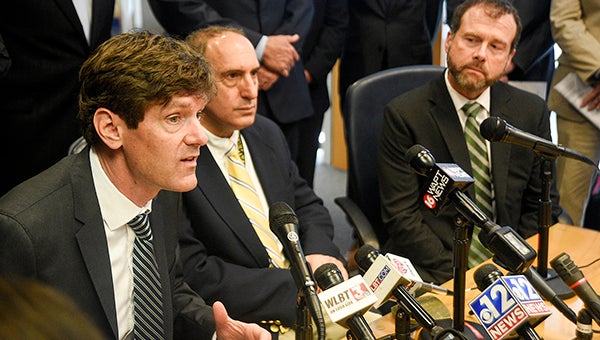Dobbs: Treat everyone as if they have coronavirus
Published 9:12 pm Friday, August 28, 2020

- Mississippi State Health Officer Dr. Thomas Dobbs, left, leads a press conference March 12 on the state's response to the COVID-19 virus. (Courtland Wells/The Vicksburg Post, file photo)
Mississippi’s chief state health official had a reminder for those listening to Thursday’s Zoom event hosted by the Vicksburg-Warren Chamber of Commerce.
“We are neck-deep in the coronavirus and it’s not going anywhere,” Dr. Thomas Dobbs said. “And that means people have to continue taking precautions to avoid the disease like continuing to wear masks, keeping away from people and avoiding crowds and large groups as much as possible. Treat every person like they have coronavirus because they could have coronavirus.”
The event was the chamber’s monthly luncheon, which for the past few months has been a virtual meeting because of the worries surrounding the COVID-19 virus.
Dobbs said there are people who want to deny coronavirus or explain it away, he said, but health officials have ways of tracking the disease. One is tracking COVID-like illness, which is a surveillance of walk-in clinics where people go with problems.
“We can immediately glean information off that chart and we know if they have coronavirus or coronavirus-type symptoms we can monitor in real-time,” Dobbs said. “We know that about half the infections are spread by people who have zero symptoms, and from our experience interviewing people who have coronavirus, a lot of times when they were spreading it they had very mild symptoms and blew it off as allergies or more benign issues.”
Masks, Dobbs said, are important and “help a lot.”
“Another thing it does is keep people from contaminating the air around us and we know that from looking at countries that have used masks as a mechanism for controlling the infection it is extremely helpful,” he said. “Also, there is clinical evidence that shows it works to prevent transmission from people to people.”
Dobbs said researchers now know there is something unique about the virus.
“That is if you get somebody just at the wrong time in their infection, probably going to be like the first day of symptoms or right before symptoms develop, they can infect dozens of people; maybe even 100 people because they’re just super efficient about spreading it in the air,” he said. “If you keep a mask on that sort of person then hopefully you can prevent some of these superspreader events that drive infection.”
Looking at the future, Dobbs said one challenge facing health care professionals is the return of children to schools. Once students begin circulating in the schools, they are no longer insulated from the rest of society, “so it will spread up to the older age groups even in the 40s and 50s and older.”
He said, however, people should avoid the temptation of dismissing the coronavirus as only a threat to certain subsets of the population because it makes everyone more vulnerable “and off our guard.”
Young people, he said, die from the coronavirus and presently have a high infection rate.
“We had an age distribution shift (in the disease) over the summer where there were more young people 18-29 age group that were being infected mainly through social activities and there was a growing number in 11-17 age group,” Dobbs said. “You can get it at any age and we are learning quite clearly that teenagers and young adults are very efficient at spreading coronavirus.”
Dobbs said health officials know the coronavirus is debilitating and can leave patients with some chronic issues.
“There’s a lot we don’t know about the long-term effects. I don’t mean to be terrified of it; we need to be thoughtful so we should understand the risks we’re facing as we go into the future,” he said. “Pay attention to the people who are doing this every day, because we’re watching it, we’re learning it. We don’t just spend five minutes on Facebook every day learning about coronavirus. We’re living it 12-14 hours a day.”






